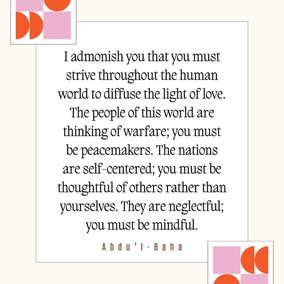The views expressed in our content reflect individual perspectives and do not represent the authoritative views of the Baha'i Faith.
We live in an information age—corporations built on information technologies have become the wealthiest and most powerful in the world.
But behind all this a fundamental problem has not been properly debated: should information be considered private property to be bought and sold, or a public good accessible to everyone like the air we breathe?
In 18th century England, the aristocrats decided to fence the pastures and make them their property, leaving peasants who formerly grazed their flocks there without resources. This was the privatization of the commons. Today we are experiencing a new privatization of the commons as knowledge and information that used to be freely available becomes the property of multinational corporations intent on managing it for maximum profit. With the medium of the new information technologies and social networks, we are all exploited to extract our information, which is assembled in “big data” without any benefit to us in return. On the contrary, our information is used to target us with the advertisements we will be most susceptible to, and with “news” that will reinforce our prejudices and confirmation biases.
The Baha’i teachings offer us general guidelines about how to deal with the problem:
Arts, crafts and sciences uplift the world of being, and are conducive to its exaltation. Knowledge is as wings to man’s life, and a ladder for his ascent. Its acquisition is incumbent upon everyone. – Baha’u’llah Epistle to the Son of the Wolf, p. 26.
Again, is there any deed in the world that would be nobler than service to the common good? Is there any greater blessing conceivable for a man, than that he should become the cause of the education, the development, the prosperity and honor of his fellow-creatures? No, by the Lord God! – Abdu’l-Baha, The Secret of Divine Civilization, p. 103.
This issue presents us all, and society in general, with an ethical challenge: where is the common good in all this? Two questions illustrate the problem:
- Is there a human right to access information, or is it normal that we have to pay for it? Perhaps we should distinguish between information to which we should have a right, such as news of the world, and other content, such as for entertainment, that we should expect to pay for. For those who cannot afford to pay for information, is it damaging for society that they do not have access? Inequality in access to information is as unjust as extremes of poverty and wealth.
- How should we reward the creators of information? Is profit the only motive for creation and innovation? What about scientific curiosity, the desire to help others, serve the common good or advance civilization? Are people inherently selfish, or can altruistic motivations be more important? How do we encourage creation for the common good, for everyone’s benefit? For individuals, an ethical education and spiritual motivation will be determinant. For corporations, which today are driven only by profit, we need to add a social motivation and responsibility to be of service to society. Profit should be one measure of efficiency among others, but not an end in itself.
A few examples will illustrate the problem. We have built a system for intellectual property rights, including patents, trade marks, and copyrights, enshrined in national law and managed globally by the UN World Intellectual Property Organization. Patents are the foundation of modern industries, and are intended to make new discoveries public in exchange for a limited period (usually 20 years) of exclusive rights. There has always been a debate about whether intellectual discoveries should be considered property, and the WIPO tries to balance public and private interests. The system is legally cumbersome, with constant lawsuits that often benefit the biggest and richest, and it has serious drawbacks. For example, a poor sick person could be cured by a patented medicine, but he will die because it is priced to maximize dividends to shareholders. For a new discovery that could improve the welfare of everyone, should we have to wait 20 years before we all can benefit, while the wealthy enjoy it first?
The Baha’i teachings call for a spiritual solution to these economic problems, and ask us all to consider the welfare of others before our own:
Regarding reciprocity and cooperation, each member of the body politic should live in the utmost comfort and welfare because each individual member of humanity is a member of the body politic, and if one member is in distress or is afflicted with some disease, all the other members must necessarily suffer. … Is it possible for one member or part to be in distress and the other members to be at ease? It is impossible! Hence, God has desired that in the body politic of humanity each one shall enjoy perfect welfare and comfort. – Abdu’l-Baha, The Promulgation of Universal Peace, p. 312.
















Comments
Sign in or create an account
Continue with Googleor